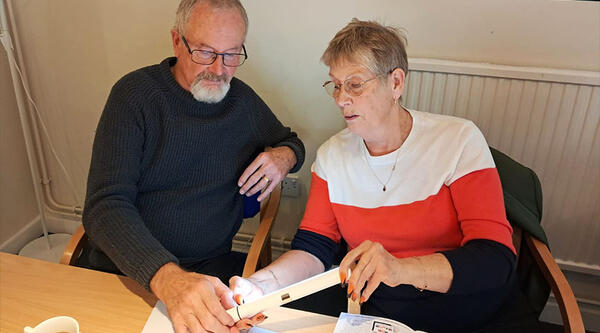How to support someone with dementia to sleep better at night
A healthy sleep routine can help the person with dementia to feel better, be less confused, be more co-ordinated and have more energy in the daytime. These tips for how to support them to sleep better can be much more effective than medication.
Understanding sleep and night-time disturbance
- How does dementia affect sleep?
- You are here: How to support someone with dementia to sleep better at night
- Sleep problems and treatments for people with dementia
- Sundowning and dementia
GPs, and other healthcare professionals, can find sleep problems in dementia difficult to treat. This is because there may be many different causes, and because medication is not very effective as a treatment. However, you can help the person by supporting them with a healthy sleep routine.
A healthy sleep routine can help the person to feel better, be less confused, be more co-ordinated and have more energy in the daytime. They may also sleep better and longer, with less disturbance at night.
How to support the person to sleep better
Treat any underlying conditions
Many health conditions can make it harder for the person to sleep. Reduce any pain or discomfort with painkillers, gentle heat or massage before bed. Ask your pharmacist if you are worried that any drugs the person is taking might be contributing to their sleep problems.
Keep a routine
Having a routine during the day and at bedtime can help when a person’s body clock doesn’t work as well as it should. Do regular activities at the same time each day – for example, go out for a walk after breakfast, play a game after lunch or listen to the radio together in the afternoon. This will provide a familiar routine that helps the person make sense of the time.
Keeping a routine for the hour or so before getting into bed should encourage feelings of sleepiness. For example, have a warm caffeine-free drink, use the toilet, change for bed, wash and brush teeth, get into bed and listen to calming music, or a favourite radio programme.
Natural daylight
Going outside in the daytime, ideally in the morning, can help to set the person’s body clock. They are more likely to feel sleepy during the evening. During the late evening you can dim lighting to encourage sleep at bedtime (unless they are getting sleepy too early).
If the person can’t go outside in the daytime, you could use a lamp or lightbox that creates a bright indoor light. These devices have a similar effect to natural light on the person’s body clock.
Fun and interesting activities
Doing enjoyable and interesting activities during the day helps to reduce daytime sleepiness. Being active can produce a satisfying feeling of tiredness that makes sleep easier at bedtime, and may also reduce feelings of anxiety and restlessness.
Physical activities, such as walking and gardening, are particularly good for improving the quality of sleep. If the person you support can do these activities for at least 20–30 minutes, during the day, several times each week, this can help. Too much activity in the evening can keep a person feeling awake.
For more information see Keeping active and involved. For ideas for enjoyable and engaging activities see The activities handbook.
Avoid caffeine
Caffeine is a stimulant that reduces feelings of sleepiness. It also makes a person need to go to the toilet more often. As the effects last for several hours, it’s best for the person to switch to non-caffeinated drinks from lunchtime onwards.
Caffeine and other stimulants in food and drink may have a greater effect in older people. For better sleep quality, offer non-caffeinated drinks, such as water, milk, natural juice, or caffeine-free tea or coffee.
Avoid cigarettes and alcohol
Smoking and drinking alcohol during the evening can make it harder to sleep properly. Nicotine increases a person’s heart rate and reduces feelings of sleepiness.
Although alcohol might make it easier to fall asleep initially, the quality of sleep is poorer and the person is more likely to wake up in the middle of the night. Alcohol makes a person need to go to the toilet more often, and this can disturb sleep.
Avoid being hungry, thirsty or too full
Eating a light meal several hours before going to sleep can stop a person being hungry in the night, or feeling too full to fall asleep. The person should drink enough so they aren’t thirsty, but not so much that they need to use the toilet several times during the night. Keep a glass of fresh water near the bed.
If the person wakes up hungry in the night, a glass of milk or a yoghurt may help to make them feel better, but shouldn’t stop them getting back to sleep. Avoid offering the person food in the night as getting used to this might mean they wake up because they are hungry.
Make the bedroom sleep-friendly
The person’s bedroom can make a big difference to their ability to sleep properly. It should be as quiet and as dark as possible. If the person is afraid of waking up in the dark, or worried about finding the toilet in the night, a nightlight may help.
The temperature should be relatively cool (about 18°C), but not cold. Keep a window open when it’s not too cold, for fresh air and to prevent the room from becoming stuffy. The bedroom should be uncluttered and the bed comfortable and supportive. Ideally it should be used only for sleeping in, or for sexual and physical intimacy.
A dementia-friendly clock that displays ‘night or day’ can help the person feel less disorientated if they wake up during the night.
For more information on making adjustments around the home, see Making your home dementia friendly.
Reduce screen time
The blue light from TVs, computers, smartphones, tablets, and other electronic devices can affect the body clock and make it harder to fall asleep. Screen devices can also be overstimulating at a time when the person needs to relax.
The person with dementia should reduce the time spent looking at screens towards the end of the day. This may help them to fall asleep more easily. If there is a TV programme they want to watch in the late evening, you could offer to record it for them. They can then watch it the next day at an earlier time.
Relax at bedtime
During the late evening try calming and relaxing activities that help the person get ready for sleep.
Some people find that a warm bath an hour or two before bedtime helps them to relax physically and mentally. Low lighting, listening to calming music or gentle massage can encourage sleepiness – particularly if they become part of a regular bedtime routine.
- Page last reviewed:








